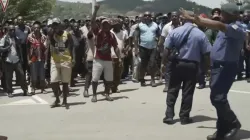Papua New Guinea PM James Marape declares state of emergency after deadly riots kill 16
The Papua New Guinea government worked to restore order after at least 16 people were reportedly killed during rioting and looting that left the country’s two biggest cities in flames.

Port Moresby: Papua New Guinea's prime minister declared a state of emergency on Thursday, suspending government and police officials after 16 people were killed in rioting in the Pacific island nation. Prime Minister James Marape told a press conference he had suspended Papua New Guinea's chief of police and top bureaucrats in the finance and treasury departments while the government conducts a review into the cause of the riots. The unrest began in the capital, Port Moresby, on Wednesday after hundreds of police officers, soldiers, prison staff and public servants walked off their jobs in protest over a pay dispute.
The Papua New Guinea government attributed the pay cut to an administrative glitch. Similar riots also caused damage in Lae, the second-biggest city in the southwestern Pacific country. The Australian Broadcasting Corporation reported that at least 16 people died in Port Moresby and Lae. An additional 180 defence personnel flew into Port Moresby on Thursday. Tensions in the country have risen amid high unemployment and increased living costs.
Video: Papua New Guinea's PM James Marape announcing a state of emergency
Marape said Port Moresby was “under stress and duress” but that violence had eased. “Police were not at work yesterday in the city and people resorted to lawlessness - not all people, but in certain segments of our city,” Marape said in a news conference on Thursday.” (The) situation report as of this morning shows tension in the city has subsided.” Many shops and banking services were closed Thursday as business owners repaired the damage.
Papua New Guinea is a diverse, developing nation of mostly subsistence farmers where some 800 languages are spoken. It is in a strategically important part of the South Pacific. With 10 million people, it is the most populous South Pacific nation after Australia, which is home to 26 million.
Albanese calls for peace
Australian Prime Minister Anthony Albanese appealed for calm. He said his government had not received any requests for help from its closest neighbour. Papua New Guinea and Australia last month signed a bilateral security pact.
“Our high commission in Port Moresby are keeping a very close eye on what is occurring there, making sure Australians are looked after,” Albanese told reporters Thursday. Papua New Guinea struggles to contain escalating tribal violence and civil unrest in remote regions and has a long-term aim to increase its police numbers from 6,000 officers to 26,000.
(With inputs from agency)